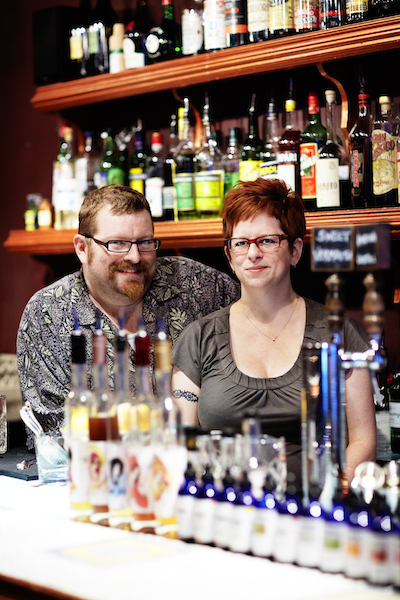Avery and Janet Glasser, the husband-and-wife team behind borough-based Bittermens, Inc., have come a long way from the days when they brewed and bottled small-batch bitters in their kitchen “laboratory.”
With their new DUMBO factory space—at 880 square feet, it’s four times larger than their previous facilities in Red Hook—Bittermens has become the third-largest bitters maker in America, behind Buffalo Trace (which makes Peychaud’s and Regan’s) and Fee Brothers. (The number-one seller in America, Angostura, is not made in the United States.).
Cocktail bitters, those tinctures infused with herbs, spices and other flavorful elements, have ridden shotgun on the cocktail renaissance of the last several years. And as drinks have grown ever more fanciful, demand for innovative ingredients has grown, creating a bull market for bitters. This is particularly true in Brooklyn, where a number of small bitters-makers have set up shop, such as Brooklyn Hemispherical Bitters, A. B. Smeby Bittering Co. and Bitters, Old Men. But Bittermens was among the first to blaze the artisan bitters trail.
They’ve come a long way: In addition to their core line of small-batch bitters in delightfully offbeat flavors such as Burlesque (hibiscus and acai) and Squirrel Nut (pecan, vanilla), in October the Glassers added citrates and shrubs, and a line of spirits in flavors such as bright cinnamon and bracingly bitter grapefruit—“flavors we couldn’t get here but wanted.”
They also run Amor y Amargo, a tiny East Village bitters bar that opened in March and has become like a secret handshake in the industry, attracting off-duty bartenders and cocktail geeks of all persuasions.
Their journey began in 2006, when Avery was a strategist with a London-based telecom company while Janet was an executive assistant at an investment bank. Living in San Francisco, the couple were just another pair of Bay Area barflies, at least until they took a guided tour through a local gin distillery. Inspired by the heady whiff of juniper berries and coriander in the botanicals room, the Glassers began to experiment by steeping spices in liquor, with the goal of creating their own bitters.
In 2007, the couple relocated to New York and brought their kitchen bitters lab with them, often gifting them to the bars they frequented.
“Phil Ward, who was the bartender at Death + Company at the time, said, ‘If you can get us enough bitters, we’ll put them on the menu in cocktails,’” recalls Avery. The Xocolatl Mole bitters (chocolate-chile pepper) were developed first, followed by grapefruit bitters and even smaller-batch “experimental bitters” such as Squirrel Nut. In the glow of positive feedback, the Glassers established a business and slowly expanded, eventually sending test batches to craft cocktail bars all over the country, soliciting input from mixologists about what they’d like to see next.
That initial flavor, Xocolatl Mole, remains on the Death + Company menu today.
“Now everyone does one,” Avery Glasser laments of the suddenly ubiquitous chocolate-spice bitters category. “I want to say, ‘Do something new.’” That’s a standard he holds himself to—for example, he refuses to make orange bitters. “Unless we can do something significantly different, I’m not going to do it,” he insists.
In fact, the drive to “do something new” is in part behind the move to the new factory. Bitters are infused, not distilled, but the duo also seek a distilling license for the Brooklyn space and are cooking up plans—not to make moonshine, but rather to use distillation “to fabricate some intense flavors.”
“We want to see what happens when you distill cacao, or chile peppers or botanicals,” Glasser says, lighting up at the prospect. “We wanted more space to work on experimental stuff,” while a partner upstate will continue the “large-batch” distilling of the Bittermens spirits line.
As with most businesses, some bitter has mixed with the sweet. In 2009, Bittermens entered into a partnership with The Bitter Truth, a larger German company. Just a year and a half later, the two entities abruptly split.
“It didn’t work out, for a number of reasons,” Glasser recalls. The agreement called for The Bitter Truth (TBT) to make the bitters in Europe, and distribute the product as Bittermens in the U.S. Since TBT also makes liqueurs and spirits, it sold the bitters as “potable” or beverage alcohol, creating distribution challenges. Suddenly, consumers and bars were complaining that they were unable to purchase Bittermens. The relationship was dissolved and “The New Bittermens” re-launched in 2010.
But that’s ancient history. These days, the Glassers are looking forward, planning to add additional spirits to the line, and perhaps a Bittermens artisan vermouth. The couple seems mighty chipper these days, but even if they didn’t, that would be OK. After all, this is one business where it’s good to be bitter.



